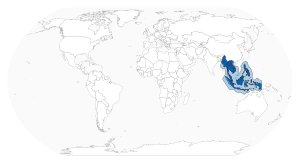
Back Vertrag von Bangkok German Tratado de la Zona Libre de Armas Nucleares del Sudeste Asiático Spanish پیمان بانکوک Persian Traité de Bangkok French Բանգկոկի համաձայնագիր Armenian Kawasan Bebas Senjata Nuklir Asia Tenggara ID 東南アジア非核兵器地帯条約 Japanese Perjanjian Zon Bebas Senjata Nuklear Asia Tenggara Malay Traktat z Bangkoku Polish Бангкокский договор Russian
| Treaty of Southeast Asia Nuclear Weapon-Free Zone | |
|---|---|
 Participation in the Southeast Asian Nuclear-Weapon-Free Zone Treaty includes all of ASEAN | |
| Type | nuclear disarmament |
| Signed | 15 December 1995 |
| Location | Bangkok |
| Effective | March 28, 1997 |
| Parties | 10 |
The Southeast Asian Nuclear-Weapon-Free Zone Treaty (SEANWFZ), or the Bangkok Treaty of 1995, is a nuclear weapons moratorium treaty between 10 Southeast Asian member-states under the auspices of the ASEAN: Brunei Darussalam, Cambodia, Indonesia, Laos, Malaysia, Myanmar, Philippines, Singapore, Thailand, and Vietnam. It was opened for signature at the treaty conference in Bangkok, Thailand, on 15 December 1995 and it entered into force on March 28, 1997 and obliges its members not to develop, manufacture or otherwise acquire, possess or have control over nuclear weapons.
The Zone is the area comprising the territories of the states and their respective continental shelves and Exclusive Economic Zones (EEZ); "Territory" means the land territory, internal waters, territorial sea, archipelagic waters, the seabed and the sub-soil thereof and the airspace above them.
The treaty includes a protocol under which the five nuclear-weapon states recognized by the Treaty on the Non-Proliferation of Nuclear Weapons (NPT), namely China, the United States, France, Russia and the United Kingdom (who are also the five permanent members of the United Nations Security Council) undertake to respect the Treaty and do not contribute to a violation of it by State parties. None of the nuclear-weapon states have signed this protocol.